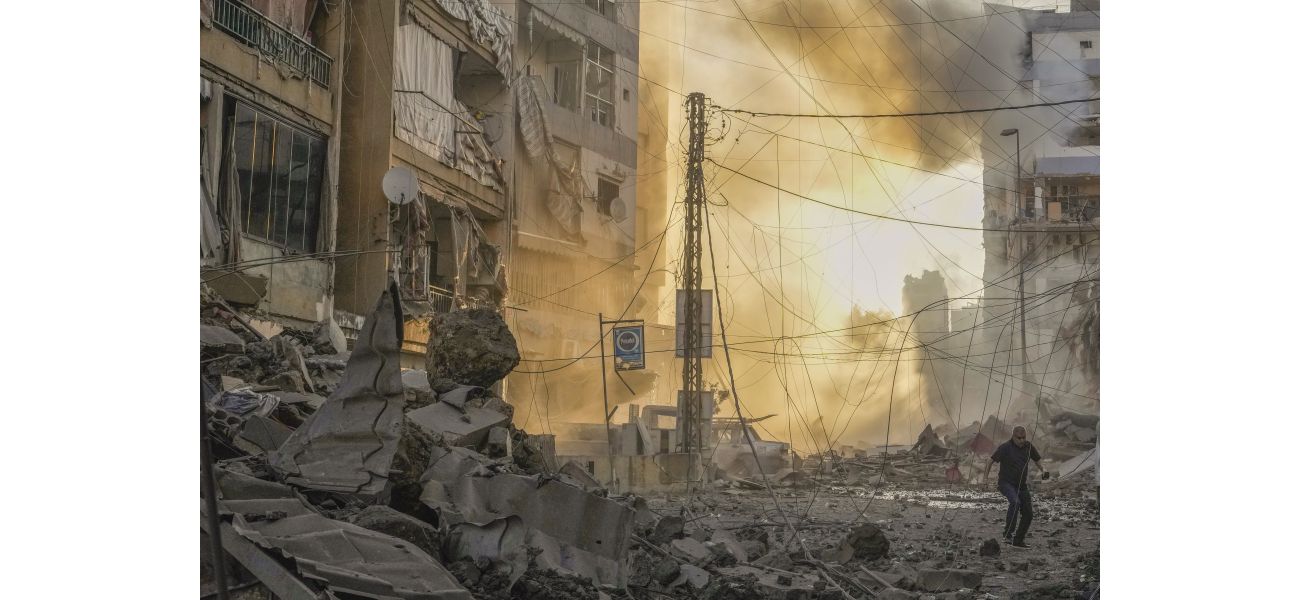Beirut rocked by Israeli airstrikes, major crossing to Syria closed.
Israel launched airstrikes, targeting Beirut suburbs and blocking the main border crossing between Lebanon and Syria, hindering thousands from escaping the bombings.
October 4th 2024.

Israel launched a series of airstrikes overnight, targeting suburbs of Beirut and disrupting the main border crossing between Lebanon and Syria. These strikes caused massive explosions and sent thick plumes of smoke and flames into the sky, with the shockwaves felt for kilometers in the Lebanese capital. The Israeli military remained tight-lipped about the intended target and there was no information yet on any casualties. However, Lebanon's state-run National News Agency reported that there were more than 10 consecutive airstrikes in the area.
In response, the Israeli military stated that Hezbollah had launched around 100 rockets into Israel on Friday, as the ongoing conflict between the two sides continued. The military also confirmed that a strike in Beirut the previous day had killed Mohammed Rashid Skafi, the head of Hezbollah's communications division. According to the military, Skafi was a senior Hezbollah terrorist and a close affiliate of high-ranking officials within the group.
Thursday's strike along the Lebanon-Syria border, about 50 kilometers east of Beirut, resulted in the closure of a road near the busy Masnaa Border Crossing. Israel stated that the crossing was being used by Hezbollah to transport military equipment from Iran and other proxies into Lebanon. The Israeli fighter jets targeted a tunnel used for smuggling weapons, as Hezbollah is known to receive much of its weaponry from Iran via Syria. The group has a presence on both sides of the border and has been fighting alongside Syrian President Bashar Assad's forces in the region.
Video footage from the Associated Press showed two large craters on either side of the road, causing traffic to come to a standstill. People were forced to abandon their vehicles and cross on foot, carrying their belongings with them. This latest strike comes as tens of thousands of people have been fleeing the war in Lebanon and crossing into Syria over the past two weeks.
The situation has escalated further as Israel warned residents in southern Lebanon to evacuate, extending beyond the UN-declared buffer zone from the 2006 war between Israel and Hezbollah. This warning came after Israel launched a ground incursion into Lebanon and has been engaged in clashes with Hezbollah militants along the border. Prior to the incursion, Israel had already carried out a series of attacks that killed several key members of the group, including their longtime leader Hassan Nasrallah.
Meanwhile, Iran's Foreign Minister Abbas Araghchi arrived in Beirut for meetings with Lebanese officials. He warned that if Israel attacks Iran, they will retaliate in a strong manner. Araghchi's visit to Beirut occurred just three days after Iran launched over 180 missiles into Israel, escalating the already tense situation and threatening to spark a regionwide war. Iran is Hezbollah's main supporter and has supplied the group with weapons and billions of dollars over the years.
In Tehran, Iran's Supreme Leader Ayatollah Ali Khamenei delivered a speech during Friday prayers, praising the recent missile strike on Israel and stating that Iran is prepared to launch more if necessary. He spoke to a crowd of thousands at the Mosalla mosque, which was adorned with a large Palestinian flag.
The strike on the main border crossing was the first time it had been cut since the start of the war. According to the Lebanese General Security, over 250,000 Syrian citizens and 82,000 Lebanese citizens have crossed into Syrian territory since Israel began its heavy bombardment of southern and eastern Lebanon on September 23. While most of the border crossings between the two countries remain open, Lebanon's Minister of Public Works confirmed that they all operate under the supervision of the state.
The violence has been ongoing since the Israel-Hamas war erupted in October 2023, with the latest clashes occurring in the Israeli-occupied West Bank city of Tulkarem. The Palestinian Health Ministry reported that 18 people were killed in an Israeli strike on a refugee camp in the city. Since the beginning of the war, over 41,000 Palestinians have been killed in the Gaza Strip, with over half of the victims being women and children, according to local health officials. In Lebanon, nearly 2,000 people have been killed, most of them since September 23, according to the Lebanese Health Ministry.
On Friday, Israel's military announced that militants in Gaza had fired two rockets into Israeli territory, marking the first time in a month that Gaza had launched rockets into Israel. The military stated that one of the rockets was intercepted by the Iron Dome missile defense system, while the other fell in an open area near the border. The number of rocket attacks from Gaza has decreased since the start of the war.
In response, the Israeli military stated that Hezbollah had launched around 100 rockets into Israel on Friday, as the ongoing conflict between the two sides continued. The military also confirmed that a strike in Beirut the previous day had killed Mohammed Rashid Skafi, the head of Hezbollah's communications division. According to the military, Skafi was a senior Hezbollah terrorist and a close affiliate of high-ranking officials within the group.
Thursday's strike along the Lebanon-Syria border, about 50 kilometers east of Beirut, resulted in the closure of a road near the busy Masnaa Border Crossing. Israel stated that the crossing was being used by Hezbollah to transport military equipment from Iran and other proxies into Lebanon. The Israeli fighter jets targeted a tunnel used for smuggling weapons, as Hezbollah is known to receive much of its weaponry from Iran via Syria. The group has a presence on both sides of the border and has been fighting alongside Syrian President Bashar Assad's forces in the region.
Video footage from the Associated Press showed two large craters on either side of the road, causing traffic to come to a standstill. People were forced to abandon their vehicles and cross on foot, carrying their belongings with them. This latest strike comes as tens of thousands of people have been fleeing the war in Lebanon and crossing into Syria over the past two weeks.
The situation has escalated further as Israel warned residents in southern Lebanon to evacuate, extending beyond the UN-declared buffer zone from the 2006 war between Israel and Hezbollah. This warning came after Israel launched a ground incursion into Lebanon and has been engaged in clashes with Hezbollah militants along the border. Prior to the incursion, Israel had already carried out a series of attacks that killed several key members of the group, including their longtime leader Hassan Nasrallah.
Meanwhile, Iran's Foreign Minister Abbas Araghchi arrived in Beirut for meetings with Lebanese officials. He warned that if Israel attacks Iran, they will retaliate in a strong manner. Araghchi's visit to Beirut occurred just three days after Iran launched over 180 missiles into Israel, escalating the already tense situation and threatening to spark a regionwide war. Iran is Hezbollah's main supporter and has supplied the group with weapons and billions of dollars over the years.
In Tehran, Iran's Supreme Leader Ayatollah Ali Khamenei delivered a speech during Friday prayers, praising the recent missile strike on Israel and stating that Iran is prepared to launch more if necessary. He spoke to a crowd of thousands at the Mosalla mosque, which was adorned with a large Palestinian flag.
The strike on the main border crossing was the first time it had been cut since the start of the war. According to the Lebanese General Security, over 250,000 Syrian citizens and 82,000 Lebanese citizens have crossed into Syrian territory since Israel began its heavy bombardment of southern and eastern Lebanon on September 23. While most of the border crossings between the two countries remain open, Lebanon's Minister of Public Works confirmed that they all operate under the supervision of the state.
The violence has been ongoing since the Israel-Hamas war erupted in October 2023, with the latest clashes occurring in the Israeli-occupied West Bank city of Tulkarem. The Palestinian Health Ministry reported that 18 people were killed in an Israeli strike on a refugee camp in the city. Since the beginning of the war, over 41,000 Palestinians have been killed in the Gaza Strip, with over half of the victims being women and children, according to local health officials. In Lebanon, nearly 2,000 people have been killed, most of them since September 23, according to the Lebanese Health Ministry.
On Friday, Israel's military announced that militants in Gaza had fired two rockets into Israeli territory, marking the first time in a month that Gaza had launched rockets into Israel. The military stated that one of the rockets was intercepted by the Iron Dome missile defense system, while the other fell in an open area near the border. The number of rocket attacks from Gaza has decreased since the start of the war.
[This article has been trending online recently and has been generated with AI. Your feed is customized.]
[Generative AI is experimental.]
0
0
Submit Comment





